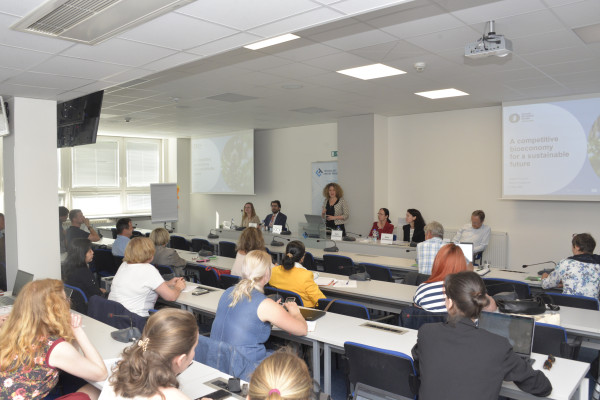TC Praha in cooperation with BIOEAST HUB CZ and the European Partnership for Circular Bioeconomy (CBE JU) organized on 14.5. national information day with the aim of presenting the possibilities of cooperation with CBE.
ENHANCING CZECH PARTICIPATION IN CBE – JU PROGRAMME
COVERING WHITE SPACE ON THE MAP

The CBE JU National Information Day 2024 organised by the Technology Centre Prague and the BIOEAST HUB Czech Republic took place on 14th May with the distinguished guests Ms Viginia Puzzolo Head of Programme Unit CBE – JU and Mr Samuele Ambrosetti representing Bio-Based Industries Consortium.
Šárka Štejnarová from the Ministry of Agriculture CZ encouraged participants to get involved in the international collaboration and appraised the activity of the Technology Centre that has been acting as a national contact point and that is celebrating 30 years in 2024. She also expressed her gratitude to the BIOEAST HUB Czech Republic, a working tool for the BIOEAST Initiative established with the support of the Ministry of Agriculture CZ as the first one in CEE Europe. Ms Štejnarová mentioned active partnerships, the Partnership for Agroecology and the Partnership for Animal Health, as possibilities for cooperation and also informed about the new partnership that is being discussed by the BIOEAST Board. “However, we face some budget issues. I believe we will be able to get involved in some [partnerships] as the Czech Republic. Partnerships are great instruments, yet Czech organizations are still unfamiliar with them”, said Ms Štejnarová. The partnership is therefore a topic of the 2nd year of the National Bioeconomy Congress that will be organised by the BIOEAST HUB CR and Technology Centre Prague in November 2024.
Ms Viginia Puzzolo introduced the Circular Bio-based Europe Joint Undertaking (CBE JU). It is a €2 billion Public-Private Partnership between the European Union and the Bio-based Industries Consortium that, supporting the circular bio-based industries, is tackling current challenges of this sector in Europe. Circular Bio-based Europe Joint Undertaking unites diverse stakeholders from the bio-based sector, including farmers and scientists, to address the sector’s technological, regulatory, and market challenges. Ms Viginia Puzzolo accented that the CBE JU Widening Participation Strategy aims to enhance research and innovation in less developed bio-based ecosystems and increase the involvement of underrepresented countries and regions in the CBE JU programme. This strategy includes ensuring meaningful participation across all actions of the CBE JU.
Mr Samuele Ambrosetti presented the Bio-based Industries Consortium that was established in 2013 in Brussels as a non-profit organization representing the private sector in a Public-Private Partnership with the European Commission to enhance Europe’s bio-based industries. BIC’s industry members span the entire value chain from primary production to the market, including sectors like agriculture, chemicals (including bioplastics), forestry, and waste management. BIC also includes associate members such as research organizations, academia, and trade associations, encompassing a diverse range of interests and expertise. BIC provides networking events: specific actions aiming to create a beneficial policy, regulatory, and financial environment for bio-based industries, such as advocating for BIC members’ interests with EU Institutions.
David Kubička, VŠCHT, highlighting collaboration benefits and the role of national representative groups. The event also features insights into the Czech Republic’s hemp sector and practical bioeconomy applications presented by Hana Gabrielová, Czech Hemp Cluster. The event was closed by presentations of two SMEs members of the BIOEAST HUB CR. Mr Tomáš Rohal, Bohempia, Ltd., described benefits of hemp-based products, Bohempia is producing a wide portfolio of items from textile to bricks. Mr Vladimír Hájek, ProPelety, briefed on the development of complete technologies for converting agricultural waste and renewable natural resources into pellets designed for mid-sized and large-scale crop farmers. Additionally, ProPelety are producing own agripellets and supply eco-friendly pellets for heating furnaces.
After the lunch, BIOEAST HUB CR organised an excursion to the company BioPreparáty, member of the BIOEAST HUB CR. BioPreparáty are providing high-quality formulations of biological products, supported by robust registration packages and patents across the EU and other regions. Additionally, they have identified beneficial properties of the microorganism Pythium oligandrum.
Ms Virgina Puzzolo and Mr Samuele Ambrosetti kindly participated in a short interview:
Why did you both come personally to Prague?
We believe that to achieve the objectives we have set in the CBE JU Widening participation strategy, the first action is to raise awareness about the CBE JU and the opportunities offered by its call. So the National Info Day organised onsite in your country was the best way to implement it.
The Czech Republic is one of the least active Countries in the CBE JU Programme now, hopefully this will change in the upcoming years. Can you perhaps provide an example of any other country or region that was lagging behind and then become active to inspire us?
Several Countries in the previous Joint Undertaking, the Biobased Industry Joint Undertake, took time before benefiting from the opportunities offered by its calls. For example, Spain is now one of the most performing countries, both in terms of applications and successful projects. Also Portugal is extremely engaged and, thanks to the effort of its National Contact Point, is increasing its participation also as coordinators of submitted proposals.
The only Czech organization that is a member of the BIC consortium is the BIOEAST HUB CR (Associated Member). Is this low participation common in other countries of the BIOEAST macro-region?
Bioeconomy is growing in relevance across Europe and our membership is expanding accordingly, both in the number of entities and in coverage of different sectors and geographies. Central and Eastern Europe holds a great potential in terms of biomass availability and scientific knowledge, which is not yet fully explored. The Czech Republic is in a position to become a bioeconomy leader in the region in the near future and today we heard some very good examples of Czech bio-based innovations and businesses. We would be happy if some of them joined BIC, and we see the presence of a strong and committed member like the BIOEAST HUB as a catalysing factor to support this growth.
Thank you very much again for your time and involvement.
Marie Kubankova
BIOEAST HUB CR Coordinator


